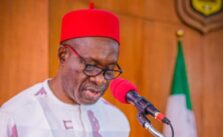Traditional religious practitioners in Anambra State have strongly opposed the recently enacted Anambra Homeland Security Law, accusing Governor Chukwuma Soludo of bias against indigenous spirituality and attempting to suppress traditional religious practices.
At a press conference in Awka on Monday, the Supreme Leader of the Traditional Practitioners Association of Nigeria, Dibia Chukwuma Ezeruonye, along with other members, denounced the law as a direct attack on their faith and an effort to stigmatize their beliefs. They also threatened to mobilise against Soludo’s reelection.
Ezeruonye expressed frustration that, since the law was passed, traditional religious worshippers have faced increased stigma, harassment, and wrongful accusations linking them to insecurity in the state.
“With the deepest sense of humility, civic responsibility, and respect, I must address my grave concerns regarding recent actions and comments from the state government targeting practitioners of indigenous spirituality (Odinani). These actions raise fundamental questions about equity, justice, and constitutional adherence,” he said.
The traditional leader specifically criticized Governor Soludo’s reported statement that “Anambra will no longer be a home for traditional practices,” calling it historically, culturally, and constitutionally flawed.
Read also: Ontario bans U.S. companies from govt contracts, cancels Starlink deal over tariffs
“The homeland security law is biased against traditional practices, generally labelling us as ‘criminals,’ which is completely false. We are law-abiding citizens contributing meaningfully to the development of the state.
“In every religion, there are both good and bad people. The authorities should focus on identifying and dealing with the bad ones instead of unfairly condemning an entire belief system,” Ezeruonye stated.
Ezeruonye accused certain Christian clerics, particularly bishops, of influencing the state government’s policies against traditionalists, warning that such interference could destabilize religious harmony in Anambra.
“Justice demands equal standards. If traditionalists must prove the efficacy of their practices, then pastors, prophets, and evangelists claiming miraculous cures must also be held to the same standard of proof. Truth and justice know no religious boundaries,” he argued.
He also criticized the outright ban on traditional sacrifices at road junctions and water bodies, stating that these practices are an integral part of Igbo cosmology and serve specific spiritual and communal functions.
“Banning them without providing alternative solutions reflects a dismissal of cultural practices integral to the identity of our people,” he added.
Ezeruonye warned that if Governor Soludo does not review the law and address traditionalists’ concerns, they will mobilize against him in the upcoming November 8, 2025, governorship election.
“We urge the governor to urgently review this law and engage in meaningful dialogue with traditional custodians. If this injustice continues, our people will speak with their votes,” he declared.
He emphasized that governance in a secular state should be fair and balanced, ensuring that no religion is elevated above others.
“Nigeria’s Constitution does not recognize a state religion. Christianity, as an organized faith, is a relatively recent introduction in the South-East, whereas our traditional worship has existed for centuries.
“Governor Soludo must acknowledge this reality and foster inclusivity rather than discrimination,” he concluded.
The traditionalists called on the state government to engage in dialogue and revise the law to ensure religious harmony and equal recognition of all faiths in Anambra.

